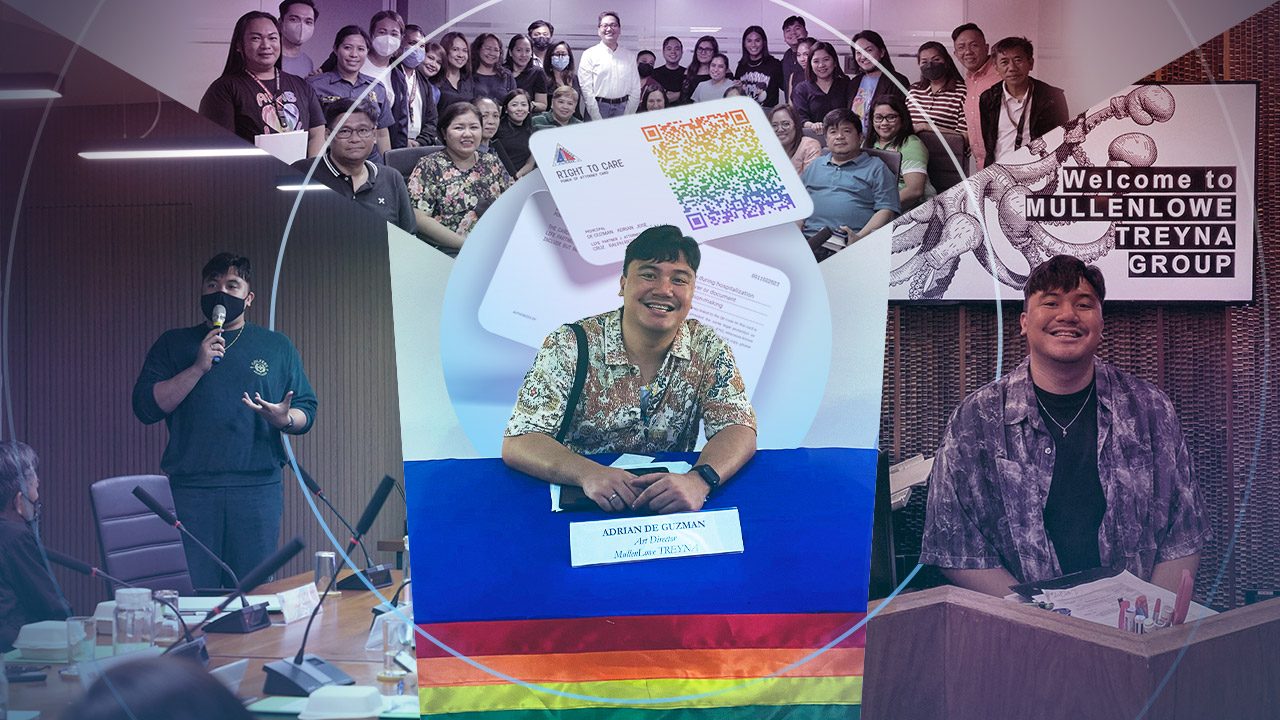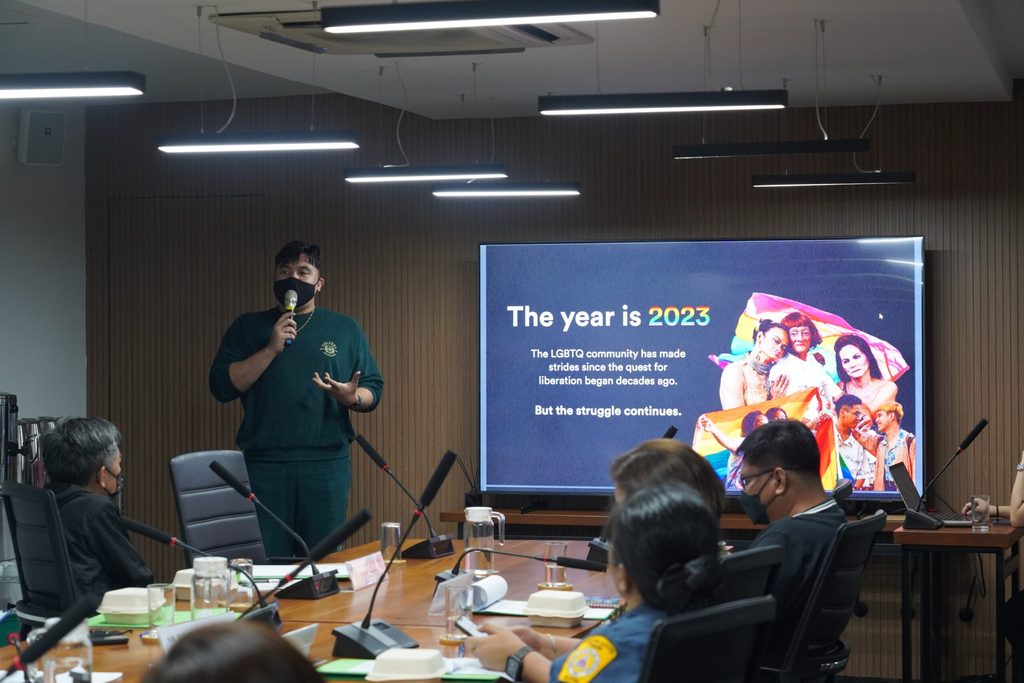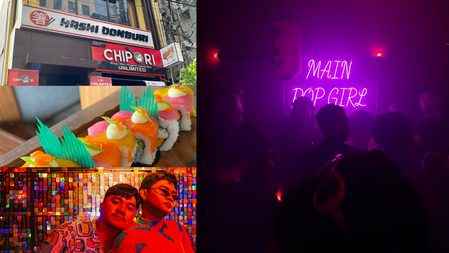SUMMARY
This is AI generated summarization, which may have errors. For context, always refer to the full article.

MANILA, Philippines – As Pride month festivities wrapped up in June, Quezon City (QC) again blazed the trail for LGBTQIA+ rights when it launched a “right to care” card, granting queer couples the legal right to make health-related decisions.
QC Mayor Joy Belmonte introduced the “right to care” card in front of 110,000 people during the city’s “Love Laban” march and festival. The card gained viral attention with praise for Mayor Joy Belmonte. There were also calls for local officials to bring the measure to their areas.
While she was reaping praises for this watershed benefit, Belmonte also credited MullenLowe TREYNA senior art director Adrian de Guzman for spearheading the initiative.

“This is not my idea. This is the idea of our friends from MullenLowe TREYNA katulad ni (such as) Adrian de Guzman at (and) Abi Aquino,” she said during her QC Pride speech.
The road for the 29-year-old advertising creative towards what would now become the “right to care” card was faced with rejections and revisions as De Guzman worked on the program for more than two years.
Beginning with reform
De Guzman said what would become the “right to care” card began as an idea two years ago that he floated with his former concept partner Xanti Gonzales in March 2021 as an advertising campaign to convince health maintenance organizations (HMOs) and hospitals to change policies on queer partners.
“It came from the problem that I pinpointed as to why something as simple as your partner wanting to visit you in the hospital where you are confined is not allowed,” he said.
He planned to do this through a video advertisement that showed a queer couple facing discrimination in different facilities and a card that would hope to certify a queer partner as an HMO dependent or beneficiary.
However, the initial plan faced different hurdles as De Guzman and his team learned to “mix and match” their approach for their different stakeholders.
“Like for example, there are different rules when it comes to public hospitals. Then there are other rules imposed by private hospitals,” he said in a mix of English and Filipino.
He also noted the Family Code as a challenge because it defined family relations as between husband and wife. Marriage being defined as a permanent union between man and woman.
This led to the project being stuck “in limbo” for around six months until it was pitched to the QC government in February 2023.
Developing the card
De Guzman attributed QC’s LGBTQ-friendly moves such as being the first city in the country to introduce a Pride council and its Gender-Fair Ordinance in bringing the pitch to the city, saying their values aligned with his vision for the card.
The “right to care card” went through three stages before it was launched as a city program: QC’s Gender and Development Council, chief of staff Weng Macatao, and Belmonte.

While hurdling those layers, they were also in touch with the city’s legal department, which led to the idea of the notarized special power of attorney to guarantee rights to queer couples such as care during hospitalization, signing any waiver or document, and disclosing personal information, among others.
The program had a “soft launch” during Quezon City’s commitment ceremony of queer couples on February 12, which also tested interest for the card.
“The couples were very curious because we set up a booth and explained to them along the way if they can be part of the program. But aside from the reception, there were also couples who registered,” he said.
While developing the “right to care” card, De Guzman recalled that one of the rights to be included in the card would also touch upon the death of the partner. However, this was dropped as the team realized that a special power of attorney would expire upon death.
“Since the scope was still wide, imagine talking about healthcare…and then we have death…. So we really have to magnify what is the problem and that is deciding on their partner’s behalf when it comes to emergencies,” he said.
Why Adrian chose advertising
Advertising was not love at first sight for De Guzman. He only realized his skills while taking up communication at Adamson University after managing to get his idea for a public service announcement immediately cleared by his professor.
“‘Yung mga sumunod sa akin or the ones before me na nagpapaapprove, talaga sinasabi na isip ka pa ng iba. So ‘yung iba, bumalik ng seven [to] eight times [na] nareject yung idea. But at that point, nag-spark sa akin ‘yung curiosity of bakit naapprove yung idea ko first pass pa lang,” De Guzman said.
(Those who were next to me who were getting their proposals approved, they were really told to think of other ideas. So they came back seven to eight times of getting their idea rejected. But at the point, my curiosity sparked on why my idea got approved on the first pass.)
He would later turn this curiosity into interning and working for different agencies before settling for his “dream agency” at MullenLowe TREYNA.
De Guzman was also instrumental in the popular LGBTQ+ podcast Pop Emergency with his co-host and Hashi Donburi owner Alwyn Mancio, which he believes is an “avenue” for queer people to see that discussing about pop culture is valid.
“People would be more invested to share these stories because we experienced this when we were kids. We just never had the chance to share it with other queer folks,” he said in a mix of English and Filipino.
Pushing for equality
Something that has stuck to De Guzman’s mind is to always think of ideas that come closest to his heart from his work in Pop Emergency to his lobbying work for the “right to care” card.

“As a gay man, the thing that is closest to my heart is the community because no one else will help us other than us helping each other,” he said.
In the future, they plan to expand the “right to care” card to include more benefits such as those surrounding insurance and death.
He added that there would be no need for Quezon City’s program if lawmakers in Congress agree that LGBTQIA+ Filipinos are entitled to equal rights and protected from discrimination, such as the proposed SOGIE Equality bill, which has been languishing in Congress for more than two decades.
De Guzman hopes that the “right to care” card would be a small step towards making this a reality, saying that applying for the card is the “closest thing” to securing a civil union and the rights that come with it.
In the meantime, he urges advocates and allies to continue putting their heart into their work as it “will naturally show” as they can contribute to something bigger ahead.
“As colorful as our pride or our spectrum of the queer community, di ba (right)? You always have the chance to make it as colorful as always. And ‘yung (the) emotion attached to something colorful is [happiness] and fulfillment,” he said. – Rappler.com
Note: Some quotes in Filipino have been translated into English.
Add a comment
How does this make you feel?



















![[In This Economy] Why the SOGIE equality bill is a step toward a more just Philippines](https://www.rappler.com/tachyon/2024/06/tl-sogie-equality.jpg?resize=257%2C257&crop=320px%2C0px%2C720px%2C720px)
There are no comments yet. Add your comment to start the conversation.